
Madhya Pradesh is a state in central India. Its capital is Bhopal, and the largest city is Indore, with Jabalpur, Ujjain, Gwalior, Sagar, and Rewa being the other major cities. Madhya Pradesh is the second largest Indian state by area and the fifth largest state by population with over 72 million residents. It borders the states of Uttar Pradesh to the northeast, Chhattisgarh to the east, Maharashtra to the south, Gujarat to the west, and Rajasthan to the northwest.
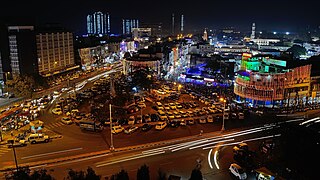
Bhopal is the capital city of the Indian state of Madhya Pradesh and the administrative headquarters of both Bhopal district and Bhopal division. It is known as the City of Lakes due to its various natural and artificial lakes. It is also one of the greenest cities in India. It is the 16th largest city in India and 131st in the world. After the formation of Madhya Pradesh, Bhopal was part of the Sehore district. It was bifurcated in 1972 and a new district, Bhopal, was formed. Flourishing around 1707, the city was the capital of the former Bhopal State, a princely state of the British ruled by the Nawabs of Bhopal. Numerous heritage structures from this period include the Taj-ul-Masajid and Taj Mahal palace. In 1984, the city was struck by the Bhopal disaster, one of the worst industrial disasters in history.

Bundelkhand is a geographical and cultural region and a proposed state and also a mountain range in central & North India. The hilly region is now divided between the states of Uttar Pradesh and Madhya Pradesh, with the larger portion lying in the latter state.

Babukodi Venkataramana Karanth widely known as B. V. Karanth was an Indian film director, playwright, actor, screenwriter, composer, and dramatist known for his works in the Kannada theatre, Kannada cinema, and Hindi cinema. One of the pioneers of the Parallel Cinema, Karanth was an alumnus of the National School of Drama (1962) and later, its Director. He received the Sangeet Natak Akademi Award (1976), six National Film Awards, and the civilian honor Padma Shri for his contributions towards the field of art.

Ram Sharan Sharma was an Indian historian and Indologist who specialised in the history of Ancient and early Medieval India. He taught at Patna University and Delhi University (1973–85) and was visiting faculty at University of Toronto (1965–1966). He also was a senior fellow at the School of Oriental and African Studies, University of London. He was a University Grants Commission National Fellow (1958–81) and the president of Indian History Congress in 1975. It was during his tenure as the dean of Delhi University's History Department that major expansion of the department took place in the 1970s. The creation of most of the positions in the department were the results of his efforts. He was the founding Chairman of the Indian Council of Historical Research (ICHR) and a historian of international repute.

Gajanan Madhav Muktibodh was one of the most prominent Hindi poets, essayists, literary and political critics, and fiction writers of the 20th century.
Surya Prakash Chaturvedi is a Cricket critic, writer and historian. He is a former professor of English at the Government Arts and Commerce College, Indore, where he taught for 35 years. He played cricket at the collegiate level, representing Indore University and Christian College, Indore as a middle order batsman. So far he has authored 13 books on the subject, all in Hindi.
Krishna Kumar is an Indian intellectual and academician, noted for his writings in the sociology and history of education. His academic oeuvre has drawn on multiple sources, including the school curriculum as a means of social inquiry. His work is also notable for its critical engagement with modernity in a colonized society. His writings explore the patterns of conflict and interaction between forces of the vernacular and the state. As a teacher and bilingual writer, he has developed an aesthetic of pedagogy and knowledge that aspires to mitigate aggression and violence. In addition to his academic work, he writes essays and short stories in Hindi, and has also written for children. He has taught at the Central Institute of Education, University of Delhi, from 1981 to 2016. He was also the Dean and Head of the institution. From 2004 to 2010, he was Director of the National Council of Educational Research and Training (NCERT), an apex organization for curricular reforms in India. He was awarded the Padma Shri by the President of India in 2011.

Pandit Ram Kishore Shukla was an Indian politician and an activist for Indian independence.
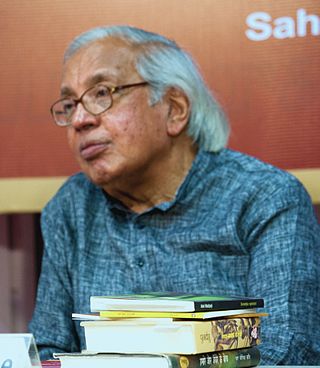
Ashok Vajpeyi is an Indian Hindi-language poet, essayist, literary-cultural critic, apart from being a noted cultural and arts administrator, and a former civil servant. He was chairman, Lalit Kala Akademi India's National Academy of Arts, Ministry of Culture, Govt of India, 2008–2011. He has published over 23 books of poetry, criticism and art, and was awarded the Sahitya Akademi Award given by Sahitya Akademi, India's National Academy of Letters, in 1994 for his poetry collection, Kahin Nahin Wahin. His notable poetry collections include, Shaher Ab Bhi Sambhavana Hai (1966), Tatpurush (1986), Bahuri Akela (1992), Ibarat Se Giri Matrayen, Ummeed ka Doosra Naam (2004) and Vivaksha (2006), besides this he has also published works on literary and art criticism: Filhal, Kuchh Poorvagrah, Samay se Bahar, Kavita ka Galp and Sidhiyan Shuru ho Gayi Hain. He is generally seen as part of the old Delhi-centric literary-cultural establishment consisting of bureaucrat-poets and academicians like Sitakanta Mahapatra, Keki Daruwalla, J.P.Das, Gopi Chand Narang, Indra Nath Choudhari and K.Satchidanandan.

Bharat Bhavan is an autonomous multi-arts complex and museum in Bhopal, India, established and funded by the Government of Madhya Pradesh.The architect of the Bharat Bhavan is Charles Correa. Opened in 1982, facing the Upper Lake, Bhopal, it houses multiple art galleries, a graphic printing workshop, a ceramics workshop, an open-air amphitheatre, a studio theatre, an auditorium, a museum of tribal & folk art and libraries of Indian poetry, classical music & folk music.
Ramesh Chandra Shah is an Indian poet, novelist, critic and the author of Sahitya Academy Award winning novel, Vinayak. He was honoured by the Government of India in 2004 with Padma Shri, the fourth highest Indian civilian award.
Gyan Chaturvedi is an Indian writer and satirist in Hindi language, known for his satirical novels, Baramasi and Narak Yathra. He was honoured by the Government of India in 2015 with Padma Shri, the fourth highest Indian civilian award.

J. S. Rajput is an Indian educationist, writer and the former director of the National Council of Educational Research and Training. After his stint as a professor at the Regional Institute of Education, Bhopal during 1974–77, he served as the principal of the institution till 1988 when he was appointed as Joint Adviser on Education to the Ministry of Human Resource Development, a post he held till 1994. When the National Council for Teacher Education (NCTE) was established in 1994, he was made the founder chairman of the council where he served until his move in 1999 to the National Council of Educational Research and Training (NCERT) as its director. He superannuated from service in 2004 and during his tenure as the head of NCERT, it was reported that he brought in regulations in BEd education by distance education method and introduced a two-year BEd course.
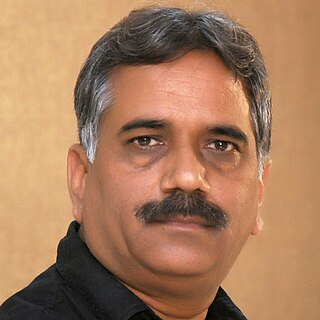
Pawan Karan is an Indian poet, columnist, editor, social and political analyst and “one of the major poets of early 21st century”.He is highly regarded for his realistic depiction of women's life in Indian society. Apart that his poems written against subjects like imperialism, capitalism, religion fanatics, social beliefs of caste based society and orthodox customs are highly appreciated as well, because of them he constantly becomes a target of religious fanatics, orthodox social view and politics and long-established norms of Indian society.
Insaaf Ki Dagar Pe is an Indian song written by Shakeel Badayuni. It is a patriotic song represents the newfound optimism of Independent India. it addresses children and tells them their responsibility as Indian citizens. This a film soundtrack of Bollywood film Gunga Jumna (1961). This song was sung by Hemant Kumar.
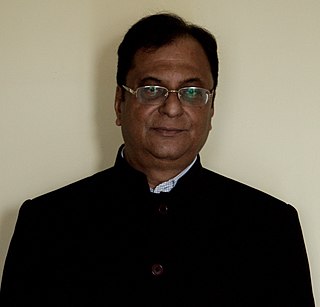
Kalyan Kumar Chakravarty is an Indian historian, art historian, writer, action anthropologist, academician and administrator, known for his intercultural and cross-disciplinary research and activism. A retired officer of the Indian Administrative Service (IAS) of the 1970 batch, he was appointed Chairman of the Lalit Kala Akademi, India’s federal fine arts academy, in 2013.
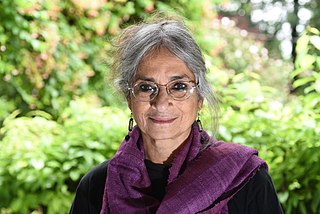
Sara Rai, is a contemporary Indian writer, editor of anthologies and translator of modern Hindi and Urdu fiction. She lives in Allahabad and New Delhi, India. Rai mainly writes and publishes short stories in Hindi. Written in a reflective prose style, her stories explore the individual complexities in the lives of ordinary people and outsiders in contemporary India.

Govindlal Vora was an Indian journalist, known for his contribution to Fearless journalism, literature, education and works in various social causes. He was founder editor of Hindi daily Amrit Sandesh. He also headed various trust and societies, in different fields of social welfare. He was active in journalism for 60 years in India.

Aalok Shrivastav is an Indian poet, lyricist and journalist. His critically acclaimed works include Aameen (2007), a poetry collection and Afreen (2012), a story collection, both published by Rajkamal Prakashan. Aalok's works have won a number of accolades for his works, including the International Pushkin Award and Dushyant Kumar Award by Madhya Pradesh Sahitya Akademi.















